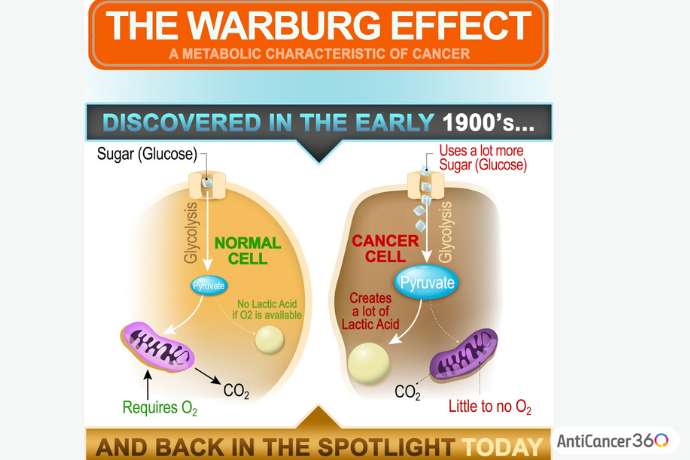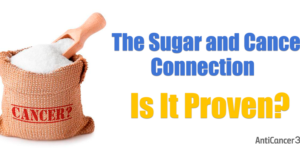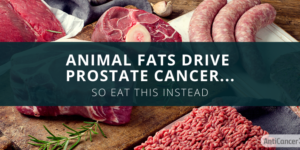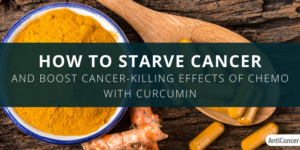Don’t have time to read? Here’s a quick summary:
- The Warburg Effect refers to the way cancers make energy with sugar. This was discovered a long time ago, but has seen a resurgence in modern science.
- Researchers at Duke University are looking at how they can help block the Warburg Effect with a natural molecule called “koningic acid.”
- Koningic acid is produced by fungi to help fight bacteria. But it can help to fight cancer by blocking the GAPDH enzyme. This decreases the cancer’s ability to utilize sugar.
- Though this strategy is not yet something that you can apply to your situation, there are many things that you can do help block cancer’s metabolism of sugar.
- Strategies to target cancer’s sugar metabolism include a ketogenic diet, and natural “anti-glycolytic” compounds. These included things like quercetin, sulforaphane, resveratrol, melatonin, and naringenin.
- Much like the koningic acid being studies at Duke University, green tea extract (EGCG) might also have some of the GAPDH blocking effects.
- EGCG may also be synergistic with a ketogenic diet because it can help to block cancer’s ability to use glutamine for fuel.
- Overall, when combining these supplements with cancer treatments, you can either take a low risk approach, or a higher risk approach (with potentially a higher reward.)
- But overall, blocking cancer’s sugar metabolism has shown potential to increase the benefits of cancer treatments.
For those of you who follow our blog, you know that we’re always talking about the connections between, sugar, cancer, and altered sugar metabolism. In today’s post we’re going to revisit this topic and show you why it’s so important to consider this aspect when you’re fighting cancer.
Most cancers process sugar in a deranged way. This is called the “Warburg Effect,” and has been known since 1924 [1]. But since its discovery, it’s also been overshadowed (and somewhat ignored) due the rise of genetics research in the 20th century.
But his has been changing in the last decade, and scientists are starting to look a lot more into the Warburg Effect.
Just recently, researchers started looking at how they could target cancer’s deranged metabolism with a natural molecule that’s produced by fungus. And though these discoveries haven’t yet been turned into solutions, they do shed light on what we CAN currently do to help fight cancer.
The Warburg Effect: Respiration vs. Glycolysis
Sugar has to undergo a variety of steps before it can turn into cellular energy.
Your healthy cells usually process sugar with an oxygen dependent process (respiration.) And when these healthy cells lack oxygen (like during intense exercise), they switch over to a process that doesn’t need oxygen (glycolysis, aka. fermentation.)
But unlike healthy cells, many cancer cells process sugar as if they are lacking oxygen all the time. This is what we referred to earlier as the Warburg Effect.
As you can imagine, anything unique to cancer cells could also be exploited as a weakness.
Targeting A Sugar Processing Enzyme
Knowing this, researchers at Duke University are looking into the possibility of targeting the glycolysis of sugar in cancer cells.
What they found was they could target an enzyme called GAPDH.
GAPDH is involved in the 6th step of glycolysis, and it controls the rate at which sugar is processed.
But what these researchers found was that you could block the function of GAPDH using a “koningic acid.” This is a natural molecule that’s produced by fungus to fight bacteria. This prevents the bacteria from stealing sugar from the fungus.
But while fungi may use koningic acid to fight bacteria, these researchers at Duke are finding that it can also help decrease tumors’ ability to process and consume sugar [2]. This occurs due to its ability to block the GAPDH enzyme.
What This Means For YOU
One of the issues with cancer research, is that it often cannot be applied to your situation. In many cases the molecule being tested may not be fully proven, nor approved for medical use.
But the research we’re talking about today CAN apply to you INDIRECTLY.
Because, what this research tells is us that there is potential benefit in targeting the glycolysis of sugar in cancer cells.
And fortunately, there are MANY different ways in which you can target glycolysis.
The Ketogenic Diet Targets Glycolysis
One of the simplest ways to target glycolysis is with diet. This can be done with a very low carbohydrates, ketogenic diet.
In this case, you’re not trying to block any of the mechanisms involved in glycolysis.
Rather, you’re just limiting the amount of sugar that the cancer cells have available to them in the first place. So the goal is to “starve the cancer” as much as possible.
I say “as much as possible” because there will always be some sugar in your blood stream. A Ketogenic diet just keeps this blood sugar level to an absolute minimum, so that you you don’t “overfeed the cancer.”
Overall, the ketogenic diet has shown the potential to help fight cancer, even in severe cases |3],[4],[5],[6].
Targeting Glycolysis In Other Ways
There are many steps that need to happen for cancer cells to process sugar. So besides just limiting sugar with a ketogenic diet, you can also help to block glycolysis in other ways using a variety of natural substances.
We previously talked about the researchers at Duke University targeting the glycolysis enzyme “GAPDH.” But we can also target other enzymes and mechanisms involved in glycolysis.
Natural compounds that could help to block glycolysis include:
Quercetin: a polyphenol found in foods like onions and apples. It has also been shown to help inhibit glucose transporters which help to bring sugar into the cells [7]. But due to poor absorption, it is best to get quercetin in a “phytosome” formulation.
Sulforphane: a plant compound found in cruciferous vegetables. This has been shown to inhibit the PFK enzyme which is also involved in glycolysis. Sulforaphane is also known to strongly upregulate enzymes involved in cellular detoxification, and may help to kill cancer stem cells [8],[9].
The best way to get sulforaphane is through broccoli sprouts. You can also get it by eating broccoli, but you’ll want to combine it with a food that’s rich in the enzyme “myrosinase” which is needed to convert it from it’s phytochemical precursor. Also, though sulforaphane can be gotten from supplements, broccoli sprouts are actually the best option [10].
Resveratrol: a compound found in grapes. Resveratrol has shown to help block glucose transporters, and help to target PK and LDH enzymes involved in glycolysis [11],[12]. It has also shown potential to target cancer stem cells [13],[14].
Melatonin: a naturally occurring hormone that is involved with sleep cycles, and maintaining your body clock. Melatonin has shown potential to target glycolysis by decreasing glucose uptake in cancer cells, and decrease the activity of the glycolytic enzyme LDH [15],[16]. This effect may also be stronger when cells are in high sugar conditions.
Naringenin: a compound found in citrus, especially grapefruit and grapefruit seed extract. This has shown potential to help fight cancer by reducing glucose uptake.
Important Note: Though you should consult with you physician before starting any dietary supplement, it’s especially important that you consult with them before taking any naringenin or grapefruit seed extract. These are especially prone to interfering with various medications.
Can Green Tea Extract Mimic The Koningic Acid Being Studied At Duke?
Overall, the best way to work against glycolysis is to target it in as many ways as possible. But something interesting I found was that the polyphenol EGCG from green tea extract may have the potential to mimic the koningic acid being investigated at Duke University.
When japanese researchers at the University of Shizuoka looked into this, they found that EGCG could also inhibit GAPDH [17] (the same glycolytic enzyme being targeted by the Duke researchers.)
EGCG has also shown to target glycolysis by inhibiting the LDHA [18] enzyme. In fact, one study found it to be as effective as other known chemical inhibitor of LDHA. It has also shown to have overall anti-cancer effects, and cancer preventative effects [19].
Green Tea EGCG On A Ketogenic Diet
So those of you who are also doing a ketogenic diet, EGCG is something you’re going to want to use anyways. The reason for this is that it could help against cancer’s ability to survive as they consume the acid glutamine [20].
But as with any supplement, bioavailability is important. And EGCG may not be very efficient at getting into your cells. Because of this, one group of researchers tried a specialized delivery formulation, and found that the anticancer effects of EGCG were greatly increased [21].
In light of this information, I’d recommend using “phytosome” formulation of EGCG Green Tea Extract. We don’t have any specific data on this, but using this type of phytosome formulation is known to greatly enhance supplement absorption.
Lastly, if you are getting your EGCG from green tea, it’s best to mix it with 50% citrus juice to maximize its bioavailability.
On Combining With Cancer Treatments
So for those of you who may be actively undergoing cancer treatment, you can also take advantage of glycolysis targeting strategies. But there are some things that you’ll want to consider when it comes to natural supplements.
A low risk approach would involve taking the supplement away from the conventional treatment. So in this case, you would be helping your body fight the cancer in between cycles of conventional treatments like chemotherapy and/or radiation therapy.
A higher risk (higher reward) approach would be to take the supplement with your other treatments at the same time, depending on the available research. The overall risk of this appears to be quite low, but there is some potential for certain supplements to interfere with certain conventional cancer treatments [22],[23],[24],[25],[26],[27].
On the other hand, some of the natural supplements I mentioned may actually increase the benefits of certain treatments, while protecting you from the symptoms and damage caused by side effects [28],[29],[30],[31] .
But most importantly for today article, the overall act of blocking glycolysis may have potential to increase the benefits of conventional treatments [32].
Conclusion
So with the resurgence of research studying the metabolic (as opposed to just genetic) aspects of cancer, scientists are looking for different ways to block cancer’s ability to consume sugar.
And while many of these strategies aren’t readily available in terms of cancer treatment, there ARE many things we can ALREADY do to combat cancer’s ability to consume sugar.
This involves strategies like the ketogenic diet, and a variety of plant compounds that have shown the potential to inhibit glycolysis. Many of these strategies are also compatible with conventional cancer treatments.
Overall, the most important thing is to be aware of all the different options that are available to you. This way you can take the best approach for your case.
Are You A Candidate For Our Program?
If you’d like to learn more about the AntiCancer360 approach and see if we can help you… either click here to schedule a free call so we can discuss your case in more detail, or watch our free online webinar to learn more about our approach.
Citations:
Gene Wei is a Board Certified Doctor of Oriental Medicine in the state of Florida, and the founder of AntiCancer360. He’s also a graduate of the University of California Los Angeles, and East West College of Natural Medicine.
His practice is focused on integrative and natural anticancer strategies. Over the years, he’s helped many people overcome difficult cancers… including some cases of “terminal cancer” which were able to be reversed with an “Aggressive Integrative Approach.”










